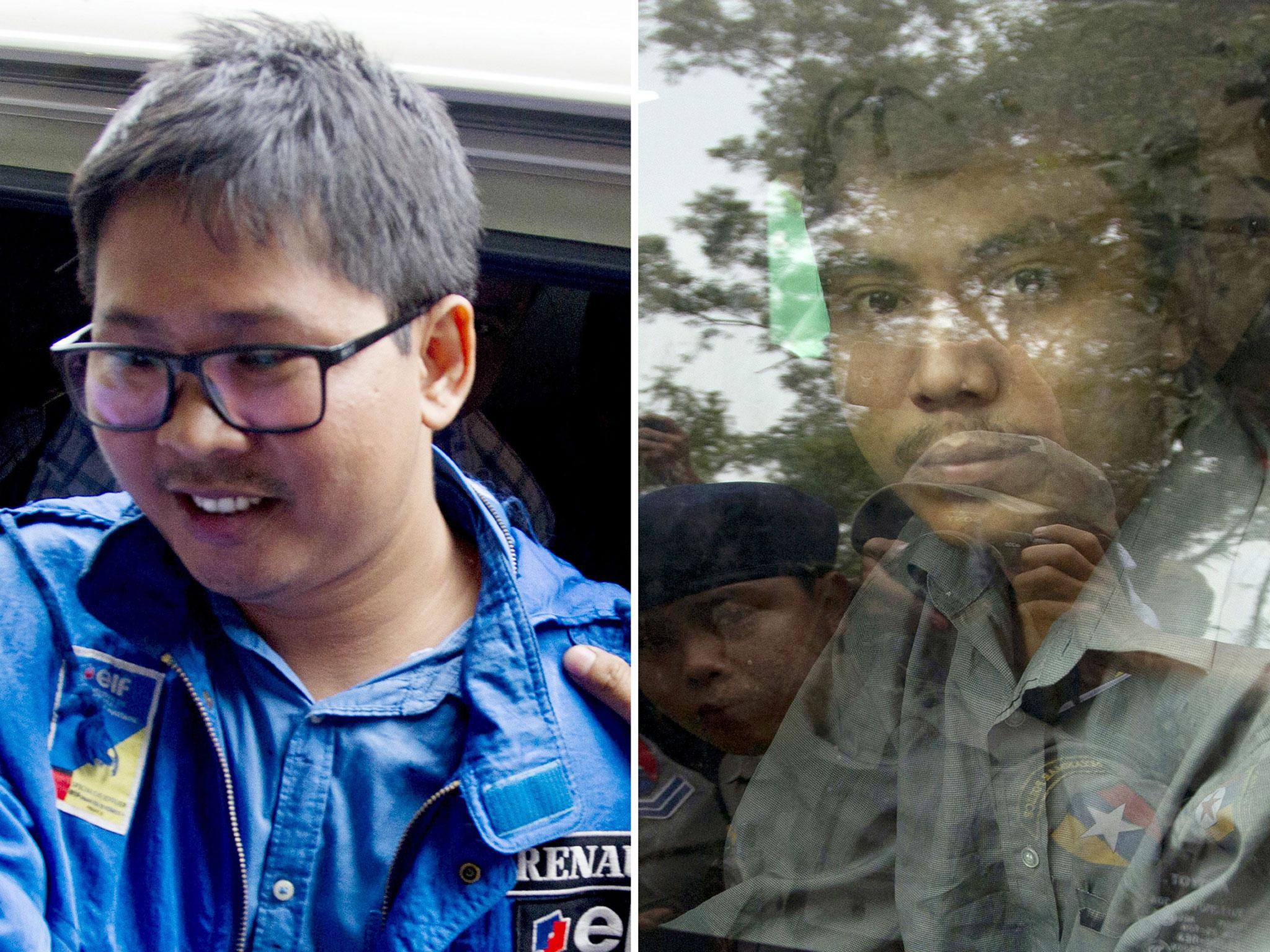Myanmar charges two Reuters journalists covering Rohingya crisis under Official Secrets Act
'I want to tell you that they are charging us like this to stop us finding the truth. Their actions are wrong and unfair', journalist says after brief hearing

Your support helps us to tell the story
From reproductive rights to climate change to Big Tech, The Independent is on the ground when the story is developing. Whether it's investigating the financials of Elon Musk's pro-Trump PAC or producing our latest documentary, 'The A Word', which shines a light on the American women fighting for reproductive rights, we know how important it is to parse out the facts from the messaging.
At such a critical moment in US history, we need reporters on the ground. Your donation allows us to keep sending journalists to speak to both sides of the story.
The Independent is trusted by Americans across the entire political spectrum. And unlike many other quality news outlets, we choose not to lock Americans out of our reporting and analysis with paywalls. We believe quality journalism should be available to everyone, paid for by those who can afford it.
Your support makes all the difference.Prosecutors in Myanmar have formally charged two Reuters reporters who were covering the country’s Rohingya crisis with violating the Official Secrets Act.
Wa Lone and Kyaw Soe Oo were arrested after police accused them of violating the colonial-era law by acquiring “important secret papers” from two police officers.
The act dates back to 1923, when Myanmar, then known as Burma, was a province of British India.
The Reuters journalists had been invited to meet police officers who worked in Rakhine state, where a harsh military crackdown is blamed for human rights abuses against the Rohingya, which sparked an exodus of 650,000 people to Bangladesh, according to UN estimates.
The government of Myanmar has admitted for the first time that its soldiers had “broken the rules of engagement” in the conflict in north-eastern Rakhine.
After the bodies of 10 Rohingya Muslims were found in a mass grave, a statement on the Facebook page of the country’s armed forces chief admitted members of the security forces – as well as “villagers” – had been involved in the killings.
The statement said 10 “Bengali terrorists” had been killed after “threatening and provoking” Buddhist villagers. The government refuses to use the term Rohingya and calls Muslims in Rakhine “Bengalis” to paint them as illegal immigrants.
Dozens of journalists waited outside court on Wednesday wearing black as a sign of protest against the Reuters reporters’ arrests. Several of their T-shirts said “journalism is not a crime” or “release the arrested journalists now”.
Reuters’ editor-in-chief, Stephen J Adler, said in a statement it was a “wholly unwarranted, blatant attack on press freedom”.
“Our colleagues should be allowed to return to their jobs reporting on events in Myanmar,” he said.
Speaking from the back of a police truck after the brief hearing, Wa Lone said: ”This is unacceptable.
“I want to tell you that they are charging us like this to stop us finding the truth. Their actions are wrong and unfair.”
The two journalists face up to 14 years in prison if convicted, according to their lawyer, Than Zaw Aung.
He appealed for the pair to be immediately released on bail, but the judge said he would review the request and rule at the next hearing on 23 January.
The Ministry of Information had previously cited police saying they were “arrested for possessing important and secret government documents related to Rakhine state and security forces”. The ministry said they “illegally acquired information with the intention to share it with foreign media”.
Human rights and media groups have criticised Myanmar’s leader, Aung San Suu Kyi, a Nobel Peace Prize laureate, for continuing to use colonial-era laws to threaten and imprison journalists.
The events have caused an international outcry, with government officials from the United States, Britain and Canada, as well as top United Nations officials, calling for the journalists’ release.
After they were detained, the UN Secretary General, Antonio Guterres, said the arrests showed how press freedom was deteriorating in Myanmar, while Rex Tillerson, the US Secretary of State, called for their immediate release.
“A free press is critical to a free society – the detention of journalists anywhere is unacceptable,” Bill Clinton, the former US President, tweeted. “The Reuters journalists being held in Myanmar should be released immediately.”
Phil Robertson, a spokesman for Human Rights Watch, said: “If Aung San Suu Kyi and her government really cared about democratic reforms and governance, they could use their parliamentary majority to quickly reform this antiquated colonial law and bring it into compliance with international human rights standards.”
Shawn Crispin, senior South-east Asia representative for the Committee to Protect Journalists, said: “These criminal charges represent a giant step backward for press freedom in Myanmar.
“The jailing of journalists shows that Aung San Suu Kyi’s government, despite its democratic mandate, is following in the repressive footsteps of her military government predecessors. And by targeting a high-profile news organisation like Reuters, it shows no journalist is safe to report on sensitive stories in Myanmar.”
Additional reporting by agencies
Join our commenting forum
Join thought-provoking conversations, follow other Independent readers and see their replies
Comments